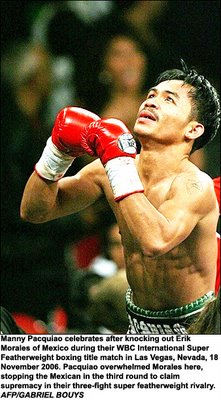Freedom under siege


Keynote Address by Vergel O. Santos during the 5th National Congress of the National Union of Journalists of the Philippines
If Defense Secretary Norberto Gonzales knows about this assembly – and in all probability he not only knows but finds a way to eavesdrop somehow – he will feel entertained by the thought that here, under one roof, indeed, in one room, sits invitingly, like a paddling of ducks, the densest collection of journalists and communists.
We may find that funny, but the joke is a serious one, and on us: in fact, it has proved deadly in not a few cases. Your own union should know best, having religiously kept count. If I’m not mistaken – and it’s easy enough to be mistaken since the count has been rising all too fast lately – your count of dead ducks among us in this season – the administration of Gonzales’s boss, Gloria Macapagal-Arroyo – is, as of the hour, about 50; that’s two-thirds of the total, counting form 1986, when democracy supposedly was restored upon the defeat of Ferdinand Marcos’s 14-year dictatorship.
Do you realize that 50 journalists are enough to staff one national daily and that, therefore, their murder means the silencing of one potential collective voice of public conscience? And silenced for what? Silenced for precisely doing what is in its perfect nature to do – speak.
To be sure, civic and political activists have suffered worse. Their own death count is from six to 14 times more – from 300 to 700. Two official theories have been advanced in their case: first, the murders have been the result of a purge inside the communist movement and, second, they have been timed with the term of a government for which anti-communism has become a matter of reflex, the easier to deflect suspicions toward it. Both theories fly in the face of actual communist practice, which sensibly and quite mercifully, confined purges to the leadership. The supposedly purged communists were actually civil-society advocates and community workers.
On the other hand, the authorities have been as quick to blame the journalists’ murder on corrupt and abusive media practice – murder is murder however well, or even nobly, intended – as they have been slow to act against the murderers themselves. At any rate, this official cold-bloodedness and twisted sense of retributive proportion cold only have created an atmosphere friendly to assassins. Its most voluble promoted has been the secretary of Justice himself, Raul Gonzales, although his nominal junior, Norberto , seems upstaging him lately.
Just a few nights ago I caught him on television raising with an audience of journalists the possibility of communists having infiltrated the news media.
“Just the possibility,” he was outwardly careful to say, although in the very next breath he invested possibility with a ring of reality, saying that communists do infiltrate the media as a matter of standing strategy- to give their propaganda a semblance of legitimacy.
If Norberto Gonzales thinks so cheaply of both the press and the communist movement – the first as easily duped, the second as recklessly presumptuous. And both possibly guilty of some crime or other against a state – we news practitioners are in as much, if definitely undeserved, trouble as the communists. We may even be in bigger trouble than we think, for not only is Gonzales someone out of an old dangerous mold of official enforcers – those programmed to feel more insecure- he also happens to work for one evidently desperate president and himself commands a hierarchy of generals. Of these generals, an apparent favorite of both his and his president’s is Jovito Palparan Jr., an army major general who seems to relish being called “executioner” as an affirmation of efficiency- efficiency in a barbaric sense. Palparan has encouraged his troops to “take the law into theor own hands” and people who feel victimized by them “to get even.”
Such as the characters that come with territory in which we operate today. How then can the territory be reasonably safe and free, never mind friendly or hospitable? How indeed can it satisfy even the barest requirements of democracy and the civilities of democratic relationships? In fact, for all the praises that it is paid in law and doctrine and on the lips of Gloria Macapagal-Arroyo, democracy is an ideal never more remote now than at any other time that this nation has pretended to it.
We certainly don’t deserve the aggravation, but before we begin to feel sorry for ourselves and risk losing perspective, let us put aside our own stakes for the moment and look at the territory as the beat and examine the quality of the two basic citizen entitlements that essentially define democracy: free voice and free vote. Until we have done that I don’t think we, as journalists, will be able to set our priorities, focus and approaches right.
But how do measure the true quality of freedom? Surely neither by the paper guarantee offered by law nor even by judicial affirmation which necessarily comes after the fact, with the victim sometimes simply to dead to appreciate the gesture. Rather, freedom is measured against the risk taken in its exercise.
In the case of free voice, the operative question is this: Is the citizen able really to speak his mind without any fear of reprisal?
The democracy deal is plain enough: Once a group of protesters decides to exercise that freedom, say, by street demonstration, it is supposed to just do it. All that it is expected to have done beforehand is give notice to the authorities, the police specifically. The point is not to seek their permission, but to simply alert them so that they can make the arrangements that will ensure order during the demonstration, all the time keeping in mind the primacy of the freedom being exercised. Those arrangements may consist in rerouting traffic and waning workers and students to start early for the day, their own right to choose to get to work or school on time having been outranked.
Alas, in reality, it is the authorities who decided, and they decide not only when and where the demonstration should take place, but also whether it should take place at all; sometime they prescribe even the colors of the shirts the demonstrators should wear and the flags and streamers they should bear, and also the markings they should have on them. Non-compliance – never mind resistance – is met with a whack on the head with a police club or bombardment with a water canon or arrest.
Thus, the principles of democratic justice are turned upside down: Where democracy is meant to err on the side of rights, freedom, and presumption of innocence, it in fact errs on the side of power, suppression, and presumption of guilt.
As for free vote, all elections have shown in varying extents that while the vote may have gone in as a free choice it does not come out the same; something invariably happens between the casting and the tallying. But the last time around the phenomenon reached such height of insult to human intelligence and of assault on morality as to break the nation’s level of tolerance: Gloria Macapagal-Arroyo was caught on tape in several telephone conversations desecrating the vote by intervening with an election commissioner, Virgilio Garcillano, for her own presidential victory. She refused to deny or confirm the voice as hers but by invoking her right against self-incrimination she effectively confessed. For how could she incriminate herself if it was not her voice in the first place?
All the same, she managed to sit herself as president and has remained sitting to this day, her time largely spent feeding the public with incredible promises and claims to achievement and downright misrepresentations to divert its attention from the desecrated vote and her desecrating voice.
That is the territory; that is our beat. And lying there hidden is the free vote and lying suppressed, the free voice. Whether we like it or not, we must find the first and free the second, for we are freedom’s last line of defense.
We simply can’t escape Arroyo, Gonzales, and Palparan without shirking our constitutional and moral duty. Indeed, if necessary we should take the fight to them – an aggressive exercise of freedom is democracy’s match to suppression and intimidation.




